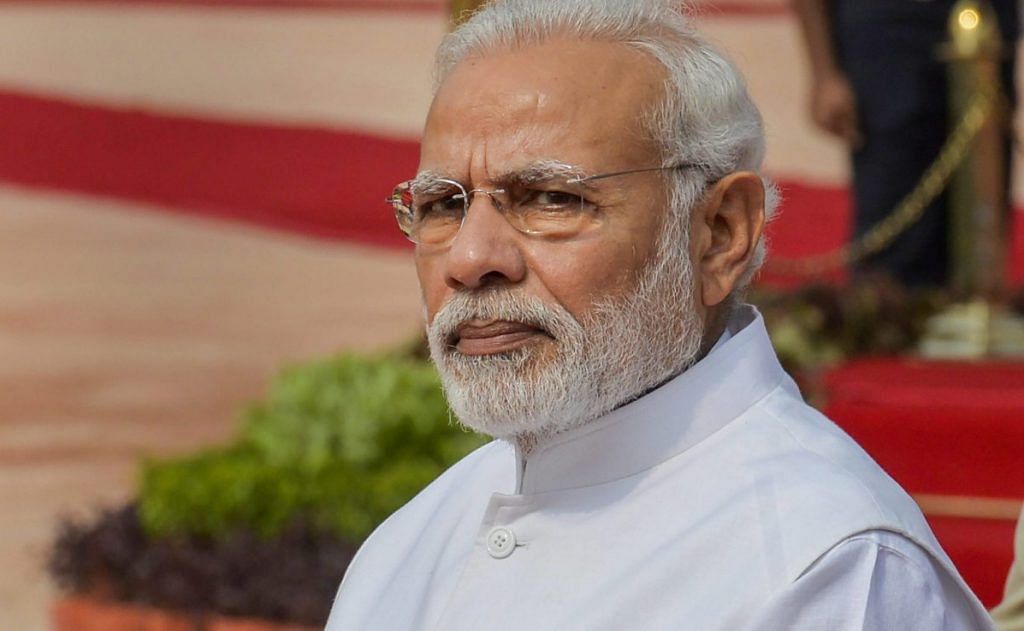When Narendra Modi became the prime minister in 2014, the first to get an absolute majority since 1984, he was powerful enough to see the land acquisition amendment bill through in the Lok Sabha. But when Rahul Gandhi said Modi’s government belonged to rich corporates — ‘suit boot ki sarkar’ — Modi went back on the amendment.
This was only the first of many instances when a powerful Modi government had to step back on an issue because of the fear of losing the political narrative. In 2016, the government withdrew an order to take NDTV India, the Hindi news channel, off air for a day. In 2017, it withdrew a ban on the sale of cattle for slaughter. In April 2018, the government brought out an order that threatened to cancel the accreditation of journalists who were accused of propagating fake news. After an uproar, this notification too was withdrawn.
In 2018, then minister of state for external affairs, M.J. Akbar, was accused of sexual harassment by several women journalists who had worked under him when he was an editor. When the accusations came out, Akbar was travelling in Africa. The media pressure was such that he was expected to resign as soon as he landed in Delhi. But the Modi government didn’t ask him to resign. As the number of accusations grew and the pressure built up, Akbar finally submitted his resignation.
Prime Minister Narendra Modi likes to avoid talking about lynching. But every once in a while, once a year on average, he gives in to pressure and issues a perfunctory statement to at least distance himself from the blame. It would be worse if he didn’t even do this, because it could give the lynch mobs even more impunity.
Also read: The Modi playbook: Delay in PM condemning attacks on Kashmiris is part of a pattern
What does Modi fear?
All these incidents show that if there’s one thing the Modi government fears, it is losing the narrative. It does not want to be painted as an outright authoritarian regime, it does not like to be called fascist or dictatorial. It pushes the limits to see how far it can go without resistance. When resistance comes, it reconsiders its position.
If there’s another thing the BJP government doesn’t like, it is the negative coverage of the PM in the foreign press. It has made the Indian press its mouthpiece, and the ones that don’t obey are irrelevant. But the foreign press narrative affects Modi’s international image, and he cares about that. Contrary to the lazy comparisons of Modi with Russia’s Vladimir Putin or Turkey’s Recep Tayyip Erdogan that the leftists make, Modi does not want to be seen in the same sentence as them. He wants to be called a great democrat. Just notice the number of times he talks about Indian democracy when he goes abroad.
Modi’s fear of narrative is our insurance against his excesses. It is proof that speaking up is not going to go in vain. It is proof that resistance is not futile. Modi is never overwhelmed by the election he has just won, because he immediately starts calculating the risks to his next election.
In 2017, there were prominent protests against lynching, under the banner ‘Not In My Name’. I had written back then that these were counter-productive, because the left-liberals needed to change the public narrative from Hindu-Muslim issues to things that might actually hurt Hindutva, such as atrocities against Dalits.
I was wrong.
The protests forced PM Modi to urge the state governments to act against cow vigilantes. No matter how meaningless the statement was, the protests had at least achieved something. The Prime Minister had been forced to acknowledge that people were being lynched in the name of the cow.
Also read: Aparna Sen & Ramachandra Guha should know sending letters to Modi only makes him look good
Competitive victimhood
You go silent over mob lynching and a bigger bombshell is dropped in the form of National Citizens Register. Now in Assam, and soon across the country, every Muslim may be branded an illegal immigrant unless they can prove their citizenship.
The intellectuals who have written a letter to the Prime Minister against the growing incidents of lynching across India, mostly of Muslims, have done the right thing. That the BJP mobilised its own people to write a counter-letter, with the standard whataboutery nonsense, shows that the original letter was powerful. If it didn’t matter, it wouldn’t have received a counter-letter. Or death threats and troll attacks.
If one letter can impact them so much that they need an entire troll army to keep digging out false narratives & throw various accusations continuously at signatories to counter the truth, imagine what would happen if we start questioning every self serving action of the regime
— Anurag Kashyap (@anuragkashyap72) July 28, 2019
“Aparna Sen and Ramachandra Guha should know sending letters to Modi only makes him look good,” writes Asim Ali. He argues that Modi’s politics is premised upon opposing these ‘rootless intellectual elites’, and the more these left-liberal intellectuals protest against Modi, the more it helps him. This is not true because, as the incidents counted above show, Modi sees any opposition from any quarter as a threat to his political narrative.
Ali further argues why we shouldn’t protest against Modi: “Populist leaders like Modi thrive on victimhood.” That’s correct. Question is, why let him have a monopoly on the politics of victimhood? If the defenders of lynching can get away with playing victim, it means those speaking on behalf of victims aren’t speaking loud enough. They need to speak loud enough so that the Modi government as well as the state governments are forced to follow the Supreme Court’s guidelines on prevention of lynchings, which have been brazenly defied.
Views are personal.
